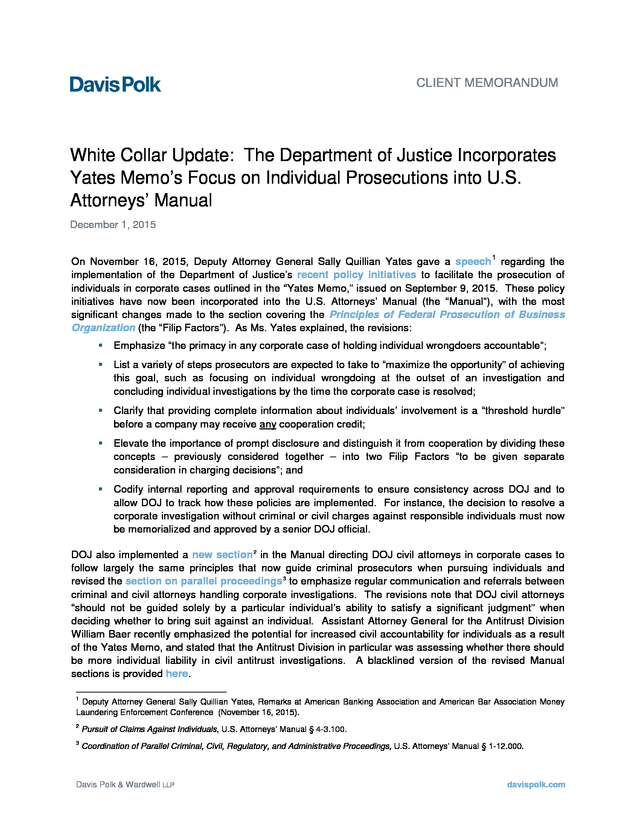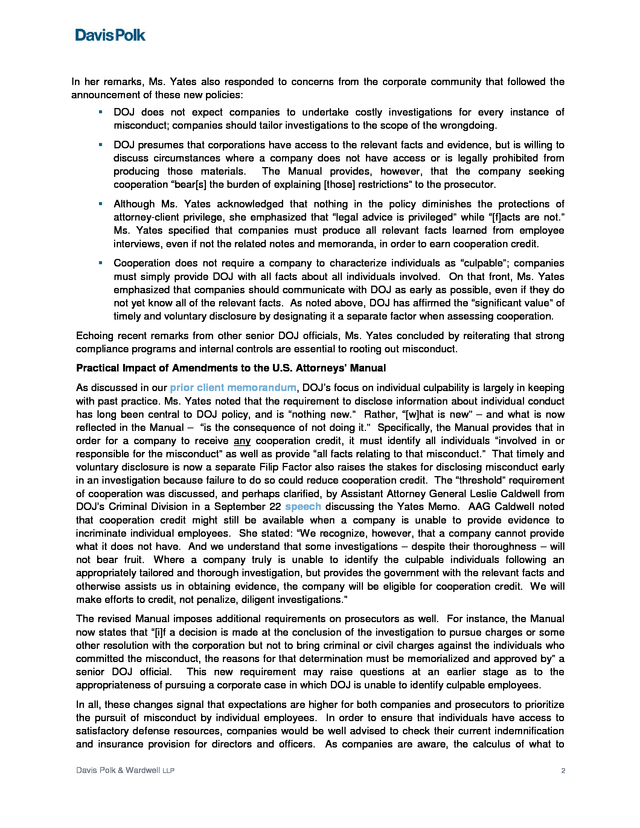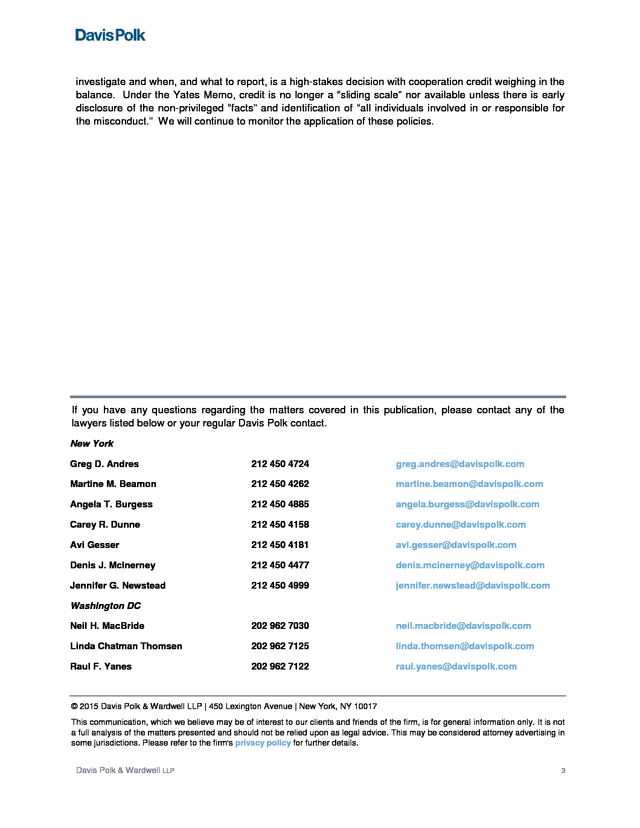White Collar Update: DOJ Incorporates Yates Memo into U.S. Attorneys’ Manual - December 1, 2015
Davis Polk & Wardwell
Description
CLIENT MEMORANDUM
White Collar Update: The Department of Justice Incorporates
Yates Memo’s Focus on Individual Prosecutions into U.S.
Attorneys’ Manual
December 1, 2015
1
On November 16, 2015, Deputy Attorney General Sally Quillian Yates gave a speech regarding the
implementation of the Department of Justice’s recent policy initiatives to facilitate the prosecution of
individuals in corporate cases outlined in the “Yates Memo,” issued on September 9, 2015. These policy
initiatives have now been incorporated into the U.S. Attorneys’ Manual (the “Manual”), with the most
significant changes made to the section covering the Principles of Federal Prosecution of Business
Organization (the “Filip Factors”). As Ms.
Yates explained, the revisions:  Emphasize “the primacy in any corporate case of holding individual wrongdoers accountable”;  List a variety of steps prosecutors are expected to take to “maximize the opportunity” of achieving this goal, such as focusing on individual wrongdoing at the outset of an investigation and concluding individual investigations by the time the corporate case is resolved;  Clarify that providing complete information about individuals’ involvement is a “threshold hurdle” before a company may receive any cooperation credit;  Elevate the importance of prompt disclosure and distinguish it from cooperation by dividing these concepts – previously considered together – into two Filip Factors “to be given separate consideration in charging decisions”; and  Codify internal reporting and approval requirements to ensure consistency across DOJ and to allow DOJ to track how these policies are implemented. For instance, the decision to resolve a corporate investigation without criminal or civil charges against responsible individuals must now be memorialized and approved by a senior DOJ official. DOJ also implemented a new section 2 in the Manual directing DOJ civil attorneys in corporate cases to follow largely the same principles that now guide criminal prosecutors when pursuing individuals and revised the section on parallel proceedings 3 to emphasize regular communication and referrals between criminal and civil attorneys handling corporate investigations. The revisions note that DOJ civil attorneys “should not be guided solely by a particular individual’s ability to satisfy a significant judgment” when deciding whether to bring suit against an individual.
Assistant Attorney General for the Antitrust Division William Baer recently emphasized the potential for increased civil accountability for individuals as a result of the Yates Memo, and stated that the Antitrust Division in particular was assessing whether there should be more individual liability in civil antitrust investigations. A blacklined version of the revised Manual sections is provided here. 1 Deputy Attorney General Sally Quillian Yates, Remarks at American Banking Association and American Bar Association Money Laundering Enforcement Conference (November 16, 2015). 2 Pursuit of Claims Against Individuals, U.S. Attorneys’ Manual § 4-3.100. 3 Coordination of Parallel Criminal, Civil, Regulatory, and Administrative Proceedings, U.S.
Attorneys’ Manual § 1-12.000. Davis Polk & Wardwell LLP davispolk.com . In her remarks, Ms. Yates also responded to concerns from the corporate community that followed the announcement of these new policies:  DOJ does not expect companies to undertake costly investigations for every instance of misconduct; companies should tailor investigations to the scope of the wrongdoing.  DOJ presumes that corporations have access to the relevant facts and evidence, but is willing to discuss circumstances where a company does not have access or is legally prohibited from producing those materials. The Manual provides, however, that the company seeking cooperation “bear[s] the burden of explaining [those] restrictions” to the prosecutor.  Although Ms. Yates acknowledged that nothing in the policy diminishes the protections of attorney-client privilege, she emphasized that “legal advice is privileged” while “[f]acts are not.” Ms. Yates specified that companies must produce all relevant facts learned from employee interviews, even if not the related notes and memoranda, in order to earn cooperation credit.  Cooperation does not require a company to characterize individuals as “culpable”; companies must simply provide DOJ with all facts about all individuals involved.
On that front, Ms. Yates emphasized that companies should communicate with DOJ as early as possible, even if they do not yet know all of the relevant facts. As noted above, DOJ has affirmed the “significant value” of timely and voluntary disclosure by designating it a separate factor when assessing cooperation. Echoing recent remarks from other senior DOJ officials, Ms.
Yates concluded by reiterating that strong compliance programs and internal controls are essential to rooting out misconduct. Practical Impact of Amendments to the U.S. Attorneys’ Manual As discussed in our prior client memorandum, DOJ’s focus on individual culpability is largely in keeping with past practice. Ms.
Yates noted that the requirement to disclose information about individual conduct has long been central to DOJ policy, and is “nothing new.” Rather, “[w]hat is new” – and what is now reflected in the Manual – “is the consequence of not doing it.” Specifically, the Manual provides that in order for a company to receive any cooperation credit, it must identify all individuals “involved in or responsible for the misconduct” as well as provide “all facts relating to that misconduct.” That timely and voluntary disclosure is now a separate Filip Factor also raises the stakes for disclosing misconduct early in an investigation because failure to do so could reduce cooperation credit. The “threshold” requirement of cooperation was discussed, and perhaps clarified, by Assistant Attorney General Leslie Caldwell from DOJ’s Criminal Division in a September 22 speech discussing the Yates Memo. AAG Caldwell noted that cooperation credit might still be available when a company is unable to provide evidence to incriminate individual employees.
She stated: “We recognize, however, that a company cannot provide what it does not have. And we understand that some investigations – despite their thoroughness – will not bear fruit. Where a company truly is unable to identify the culpable individuals following an appropriately tailored and thorough investigation, but provides the government with the relevant facts and otherwise assists us in obtaining evidence, the company will be eligible for cooperation credit.
We will make efforts to credit, not penalize, diligent investigations.” The revised Manual imposes additional requirements on prosecutors as well. For instance, the Manual now states that “[i]f a decision is made at the conclusion of the investigation to pursue charges or some other resolution with the corporation but not to bring criminal or civil charges against the individuals who committed the misconduct, the reasons for that determination must be memorialized and approved by” a senior DOJ official. This new requirement may raise questions at an earlier stage as to the appropriateness of pursuing a corporate case in which DOJ is unable to identify culpable employees. In all, these changes signal that expectations are higher for both companies and prosecutors to prioritize the pursuit of misconduct by individual employees.
In order to ensure that individuals have access to satisfactory defense resources, companies would be well advised to check their current indemnification and insurance provision for directors and officers. As companies are aware, the calculus of what to Davis Polk & Wardwell LLP 2 . investigate and when, and what to report, is a high-stakes decision with cooperation credit weighing in the balance. Under the Yates Memo, credit is no longer a “sliding scale” nor available unless there is early disclosure of the non-privileged “facts” and identification of “all individuals involved in or responsible for the misconduct.” We will continue to monitor the application of these policies. If you have any questions regarding the matters covered in this publication, please contact any of the lawyers listed below or your regular Davis Polk contact. New York Greg D. Andres 212 450 4724 greg.andres@davispolk.com Martine M. Beamon 212 450 4262 martine.beamon@davispolk.com Angela T.
Burgess 212 450 4885 angela.burgess@davispolk.com Carey R. Dunne 212 450 4158 carey.dunne@davispolk.com Avi Gesser 212 450 4181 avi.gesser@davispolk.com Denis J. McInerney 212 450 4477 denis.mcinerney@davispolk.com Jennifer G.
Newstead 212 450 4999 jennifer.newstead@davispolk.com Neil H. MacBride 202 962 7030 neil.macbride@davispolk.com Linda Chatman Thomsen 202 962 7125 linda.thomsen@davispolk.com Raul F. Yanes 202 962 7122 raul.yanes@davispolk.com Washington DC © 2015 Davis Polk & Wardwell LLP | 450 Lexington Avenue | New York, NY 10017 This communication, which we believe may be of interest to our clients and friends of the firm, is for general information only.
It is not a full analysis of the matters presented and should not be relied upon as legal advice. This may be considered attorney advertising in some jurisdictions. Please refer to the firm's privacy policy for further details. Davis Polk & Wardwell LLP 3 .
Yates explained, the revisions:  Emphasize “the primacy in any corporate case of holding individual wrongdoers accountable”;  List a variety of steps prosecutors are expected to take to “maximize the opportunity” of achieving this goal, such as focusing on individual wrongdoing at the outset of an investigation and concluding individual investigations by the time the corporate case is resolved;  Clarify that providing complete information about individuals’ involvement is a “threshold hurdle” before a company may receive any cooperation credit;  Elevate the importance of prompt disclosure and distinguish it from cooperation by dividing these concepts – previously considered together – into two Filip Factors “to be given separate consideration in charging decisions”; and  Codify internal reporting and approval requirements to ensure consistency across DOJ and to allow DOJ to track how these policies are implemented. For instance, the decision to resolve a corporate investigation without criminal or civil charges against responsible individuals must now be memorialized and approved by a senior DOJ official. DOJ also implemented a new section 2 in the Manual directing DOJ civil attorneys in corporate cases to follow largely the same principles that now guide criminal prosecutors when pursuing individuals and revised the section on parallel proceedings 3 to emphasize regular communication and referrals between criminal and civil attorneys handling corporate investigations. The revisions note that DOJ civil attorneys “should not be guided solely by a particular individual’s ability to satisfy a significant judgment” when deciding whether to bring suit against an individual.
Assistant Attorney General for the Antitrust Division William Baer recently emphasized the potential for increased civil accountability for individuals as a result of the Yates Memo, and stated that the Antitrust Division in particular was assessing whether there should be more individual liability in civil antitrust investigations. A blacklined version of the revised Manual sections is provided here. 1 Deputy Attorney General Sally Quillian Yates, Remarks at American Banking Association and American Bar Association Money Laundering Enforcement Conference (November 16, 2015). 2 Pursuit of Claims Against Individuals, U.S. Attorneys’ Manual § 4-3.100. 3 Coordination of Parallel Criminal, Civil, Regulatory, and Administrative Proceedings, U.S.
Attorneys’ Manual § 1-12.000. Davis Polk & Wardwell LLP davispolk.com . In her remarks, Ms. Yates also responded to concerns from the corporate community that followed the announcement of these new policies:  DOJ does not expect companies to undertake costly investigations for every instance of misconduct; companies should tailor investigations to the scope of the wrongdoing.  DOJ presumes that corporations have access to the relevant facts and evidence, but is willing to discuss circumstances where a company does not have access or is legally prohibited from producing those materials. The Manual provides, however, that the company seeking cooperation “bear[s] the burden of explaining [those] restrictions” to the prosecutor.  Although Ms. Yates acknowledged that nothing in the policy diminishes the protections of attorney-client privilege, she emphasized that “legal advice is privileged” while “[f]acts are not.” Ms. Yates specified that companies must produce all relevant facts learned from employee interviews, even if not the related notes and memoranda, in order to earn cooperation credit.  Cooperation does not require a company to characterize individuals as “culpable”; companies must simply provide DOJ with all facts about all individuals involved.
On that front, Ms. Yates emphasized that companies should communicate with DOJ as early as possible, even if they do not yet know all of the relevant facts. As noted above, DOJ has affirmed the “significant value” of timely and voluntary disclosure by designating it a separate factor when assessing cooperation. Echoing recent remarks from other senior DOJ officials, Ms.
Yates concluded by reiterating that strong compliance programs and internal controls are essential to rooting out misconduct. Practical Impact of Amendments to the U.S. Attorneys’ Manual As discussed in our prior client memorandum, DOJ’s focus on individual culpability is largely in keeping with past practice. Ms.
Yates noted that the requirement to disclose information about individual conduct has long been central to DOJ policy, and is “nothing new.” Rather, “[w]hat is new” – and what is now reflected in the Manual – “is the consequence of not doing it.” Specifically, the Manual provides that in order for a company to receive any cooperation credit, it must identify all individuals “involved in or responsible for the misconduct” as well as provide “all facts relating to that misconduct.” That timely and voluntary disclosure is now a separate Filip Factor also raises the stakes for disclosing misconduct early in an investigation because failure to do so could reduce cooperation credit. The “threshold” requirement of cooperation was discussed, and perhaps clarified, by Assistant Attorney General Leslie Caldwell from DOJ’s Criminal Division in a September 22 speech discussing the Yates Memo. AAG Caldwell noted that cooperation credit might still be available when a company is unable to provide evidence to incriminate individual employees.
She stated: “We recognize, however, that a company cannot provide what it does not have. And we understand that some investigations – despite their thoroughness – will not bear fruit. Where a company truly is unable to identify the culpable individuals following an appropriately tailored and thorough investigation, but provides the government with the relevant facts and otherwise assists us in obtaining evidence, the company will be eligible for cooperation credit.
We will make efforts to credit, not penalize, diligent investigations.” The revised Manual imposes additional requirements on prosecutors as well. For instance, the Manual now states that “[i]f a decision is made at the conclusion of the investigation to pursue charges or some other resolution with the corporation but not to bring criminal or civil charges against the individuals who committed the misconduct, the reasons for that determination must be memorialized and approved by” a senior DOJ official. This new requirement may raise questions at an earlier stage as to the appropriateness of pursuing a corporate case in which DOJ is unable to identify culpable employees. In all, these changes signal that expectations are higher for both companies and prosecutors to prioritize the pursuit of misconduct by individual employees.
In order to ensure that individuals have access to satisfactory defense resources, companies would be well advised to check their current indemnification and insurance provision for directors and officers. As companies are aware, the calculus of what to Davis Polk & Wardwell LLP 2 . investigate and when, and what to report, is a high-stakes decision with cooperation credit weighing in the balance. Under the Yates Memo, credit is no longer a “sliding scale” nor available unless there is early disclosure of the non-privileged “facts” and identification of “all individuals involved in or responsible for the misconduct.” We will continue to monitor the application of these policies. If you have any questions regarding the matters covered in this publication, please contact any of the lawyers listed below or your regular Davis Polk contact. New York Greg D. Andres 212 450 4724 greg.andres@davispolk.com Martine M. Beamon 212 450 4262 martine.beamon@davispolk.com Angela T.
Burgess 212 450 4885 angela.burgess@davispolk.com Carey R. Dunne 212 450 4158 carey.dunne@davispolk.com Avi Gesser 212 450 4181 avi.gesser@davispolk.com Denis J. McInerney 212 450 4477 denis.mcinerney@davispolk.com Jennifer G.
Newstead 212 450 4999 jennifer.newstead@davispolk.com Neil H. MacBride 202 962 7030 neil.macbride@davispolk.com Linda Chatman Thomsen 202 962 7125 linda.thomsen@davispolk.com Raul F. Yanes 202 962 7122 raul.yanes@davispolk.com Washington DC © 2015 Davis Polk & Wardwell LLP | 450 Lexington Avenue | New York, NY 10017 This communication, which we believe may be of interest to our clients and friends of the firm, is for general information only.
It is not a full analysis of the matters presented and should not be relied upon as legal advice. This may be considered attorney advertising in some jurisdictions. Please refer to the firm's privacy policy for further details. Davis Polk & Wardwell LLP 3 .















